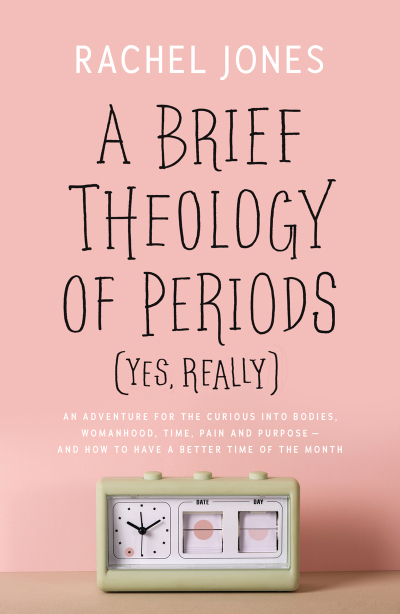‘Theology of Periods’: Christian author shares women’s silent struggles with taboo topic

After writing a book series on prayer, including how to pray during a global crisis, author Rachel Jones pondered over what issue her next book would tackle.
The first words that came to her mind were: “Theology, God, and the menstrual cycle.”
These three words became the focus of Jones' writing for her newest title, “A Brief Theology of Periods (Yes, really),” (Good Book Company, May 2021).
The 29-year-old author, who works as the vice-president of editorial for The Good Book Company in Epsom, England, describes her book on the front cover as “an adventure for the curious into bodies, womanhood, time, pain and purpose — and how to have a better time of the month.”
In an interview with The Christian Post, Jones said the idea to write her book "stemmed partly from curiosity about my own periods and why God would make it happen and recognition of the fact that it’s a part of life that we don’t often talk about in church circles. But, also, the acknowledgment that, for some women, it’s a huge part of life. … They are faced with conditions such as endometriosis [and] polycystic ovaries. … Some women struggle with their periods a lot and I wanted to speak into that and provide a word of encouragement to women like them from a Christian perspective.”
Within the pages of A Brief Theology of Periods, Jones aims to answer such questions as, “How does God speak about the menstrual cycle?"

In her book, Jones contends that churches tend to be “squeamish” when it comes to the topic of periods. She also observes that in recent years, the topic has become less taboo in secular society.
“Oftentimes, it’s men speaking in the front of the church and they don’t want to talk about periods,” Jones said. “My book reflects the cultural environment that we’re in. … After reading my book, I want readers to feel that God sees and knows and cares about this part of their life, which is often quite a hidden area. ... God cares about our whole being, including these kinds of potentially awkward or embarrassing things that we don’t often talk about.”
Jones hopes that when women read her book, they will feel encouraged with how God has made them, saved them, and how God “speaks living truth into all parts of life, even periods.”
For Jones, being able to openly discuss her own menstrual cycle took some getting used to because, normally, the topic would elicit feelings of unease.
In a recent conversation, Jones said someone asked her about the topic of her new book. To her “slight discomfort,” Jones told the person that it was about periods.
“I was like, ‘Ah ... OK, we’re going there,’” Jones said with a laugh as she recalled the moment she shared her book’s topic with the inquirer. “I definitely didn’t see myself writing this book 10 years ago or even a few years ago. It just happened. … And there has been an overwhelmingly positive response.”
Women tend to struggle with talking about their periods, Jones said, because “there are difficult questions to grapple with.” While she wants women to celebrate how God created them and the purpose of their periods, she also understands that for many women, the monthly cycle brings immense pain, discomfort and concern.
“For a woman with endometriosis, they often don’t feel like their periods are a positive thing that comes from God, which is part of living in a world that’s under the curse. And that’s part of the broader picture of ‘Why does God allow suffering?’” Jones added. “For a lot of women, their periods can be the cause of emotional stress, embarrassment and pain. Those are not things that we have to celebrate.”
While Jones said she finds that the Bible provides “good” answers that address suffering and questions about why God allows bad things to happen when it comes to every form of physical or mental anguish, she noted that it can often be hard to see God’s purpose in those moments.
The idea that discomfort and pain experienced during periods are a direct result of the fall and original sin is also addressed in Jones' book.
“The Bible starts with a picture of a perfect world, with man and woman living under God’s rule in this perfect garden and their commission to populate the Earth, subdue it, and that, by implication, is going to involve childbirth for the woman. What’s really interesting is that we have this commissioning in Genesis 1 to fill the Earth, and in Genesis 3, after the man and woman have rebelled against God, He announces His curse on Creation. It's really interesting that it exerts the very things that were blessings that He declared on them before,” Jones said.
“Adam still has to work the Earth, but it’s going to be difficult. There’s going to be thorns and thistles. And the woman is still going to bear children, but now that’s going to be painful for her,” Jones added, noting that original sin led to aspects of life being “very laborsome.”
“Labor is painful, but the whole system of pregnancy and also the monthly cycle — all of it seems so labored and so painful for so many women, and yes, it’s part of living in a world where God’s blessings have been tainted by the effects of sin,” Jones said.
The stories of multiple women in various stages of life are featured in Jones’ book. One woman discusses her battle with endometriosis.
“During my interviews with some of the women, I saw a sense of real frustration in them and a sense of ‘Why God, why are you letting this happen?’ And a sense of injustice that women suffer in this way and men don’t seem to suffer in this way,” Jones recounted. “Some of the women I interviewed felt that women seem to get a worse lot than men do.”
Even after writing her book, in which she highlights scriptures related to the menstrual cycle, Jones admits that she still struggles at times to fully understand how the menstrual cycle is addressed in the Bible because she said periods are “not a straightforward topic in the Bible.”
“The Bible presents questions about uncleanness and the passages are quite difficult to grapple with and to understand,” she said. “While the Bible doesn’t answer every question that we have, it speaks words of hope and freedom.”
Despite not knowing all the answers about the menstrual cycle as it pertains to the Bible, Jones said that while writing A Brief Theology of Periods, she went through a learning process.
She said it was “interesting” to talk to some of the women she interviewed about menopause. Jones also found out more about premenstrual dysphoric disorder — which can be categorized as a heightened premenstrual syndrome, which causes severe irritability, depression or anxiety in the week or two before a woman’s period begins. Symptoms can go away two to three days after the woman’s period starts.
“I definitely had my eyes opened to what a lot of women go through and just how many different people that I spoke to struggle with a specific area,” she said. “I did some reading on premenstrual dysphoric disorder and that is a mental health condition that many women go through and that can be very extreme. And I learned a little about menopause because, obviously, that’s not an area I've personally gone through. … That's down the tracks for me, but that also seems like a rough gig.”
One woman Jones interviewed went into great detail about her decadeslong struggle with her periods.
Bea (a pseudonym) worked as a teacher and felt her monthly cycles were negatively affecting her job performance.
She had seen many doctors who performed a series of medical tests, internal and external scans, as well as exploratory surgery. After several months, as detailed in Jones’ book, Bea was told by doctors, “We just don’t know what it is. We’ve got no answers.”
“Bea told me that sometimes she wondered why, but she said she also can really see that God has been with her through that and He has answered prayer and that her church family has been amazing as well as, her small group has been really supportive,” Jones said. “It was just a really beautiful picture and I was really humbled by Bea’s faith and by her grace in that, and the way God had been sustaining her.”
Jones said she hopes that more people will read her book, and as a result, more churches will start hosting support groups for women experiencing difficulty with periods and the complications that stem from that.
“Every church is going to be different and every woman is going to be different in terms of what she needs, but I would love to think that after reading my book, more women will feel comfortable sharing with others and receive support and encouragement from their churches,” she said. “I also hope that pastors would be willing to provide pastoral support to their women through these kinds of issues, just as much as they would if it was another condition and that there would be a willingness to engage in this if that’s the need of their flock.”
The emotional toll of periods varies in many ways depending on a woman’s age and their phase of life, according to Jones, because some women might experience disappointment at certain points in their life when they have their period. For example, she said in circumstances when women are trying to have babies and they cannot become pregnant, each passing menstrual cycle can cause disappointment.
“If you haven't had children or you feel like you’re a life wasted because you feel like you’ve gone through all this suffering for nothing, the Bible speaks very positively and very affirmingly of the value of spiritual mothering,” Jones said. “There’s more than one way to be a mother in the New Testament’s eyes. And we have biological children and we can also have spiritual children that we might not be able to see or even identify, but that God sees and knows and that is precious to Him.”





















